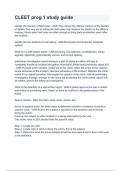CLEET prog 1 study guide
Identify the function of field notes - ANS-They relieve the officers memory of the burden
of details. The very act of writing the field notes help impress the details on the officer's
memory. Notes even brief ones are often enough to bring back recollection years after
the incident.
Identify the two systems of note taking - ANS-Permanent and temporary notebook
system.
What is in a well written report - ANS-Accuracy, Conciseness, completeness, clarity,
legibility, objectivity, grammatically correct, and correct spelling.
preliminary investigation report writing is a plan of attack an officer will take to
completely handle an incident and gather information. What does preliminary stand for?
- ANS-Proceed to the incident, render aid to the victim, effect the arrest of the suspect,
locate witnesses of the incident, interview witnesses of the incident, Maintain the crime
scene in its original condition, interrogate the suspect of the crime, note all preliminary
investigation findings, arrange for the crime lab to process the crime scene, report is to
be written, yield to the follow-up investigators.
What is the definition of a well written report - ANS-A police report is the oral or written
accounting of something seen, heard, or done by a officer in the performance of his
duties.
Report content - ANS-The Who, what, when, where, why
Active vs passive voice, the three steps to determine weather a sentence is active or
passive voice. - ANS-Active: the subject is specified in the sentence and is directly
doing the action.
Passive: the subject is either implied or is being acted upon by the verb
The active voice in 20% shorter than the passive voice.
Step 1. Locate the verb
Step 2. Locate who or what is doing the action, this is the subject.
Step 3. Determine what the actual subject should be and place it just in front of the verb
in the sentence.
, Inappropriate words for law enforcement - ANS-Slang, jargon, non-standard
abbreviations. Unless you are quoting someone.
Identify the difference between statutory law and case law - ANS-Statutory law: the
legal form of the law passed down from the legislature.
Case law: those cases were the Oklahoma Supreme Court and the court of criminal
appeals have interpreted statutory law in very specific cases.
Identify the difference of a private wrong and a crime - ANS-Civil: wrong against an
individual, an action for recovery of damages caused by the tort is brought by an
individual.
Crime: an offense against the public, an action is brought by the government, subjective
intent is generally required.
Recognize the different courts - ANS-Municipal court not of record: non lawyer judge,
fine up to $50, can only jail for failure to pay fines and costs, with juveniles they only
deal with traffic offenses, may not provide jury trial.
Municipal court not of record: judge is a lawyer, fine up to $500, 30 days in jail, may
provide jury trial, limited power over juveniles but cannot jail them.
Municipal court of record: population of 65,000, judge is a lawyer, fine up to $1,200, jail
to 90 days, power over juveniles but cannot jail, may provide jury trials
District court: a court of general jurisdiction, has unlimited jurisdiction over all justifiable
matters, may issue writs, judgments, and decrees; judge is lawyer, has 3 judges,
district, associate district, and special.
Court of criminal appeals: judges are lawyers, has jurisdiction in all criminal matters, is
the highest court in OK for criminal cases.
definition of a crime - ANS-An act or omission, forbidden by law, to which a government
applies monetary and or penal sanctions. It is a public offense.
Burden of proof for civil and criminal cases - ANS-Civil: preponderance of the evidence.
Grater than 50%
Criminal: beyond a reasonable doubt.
Elements needed for intentional tort - ANS-Assault, battery, false imprisonment,
trespass/conversion, malicious prosecution.




